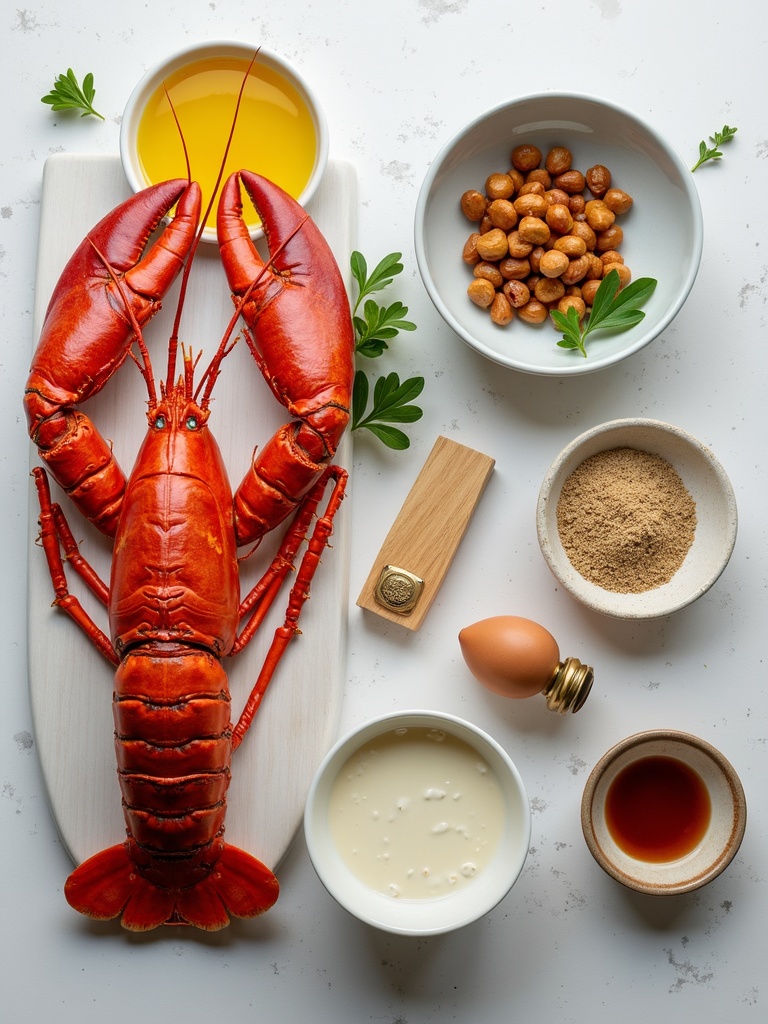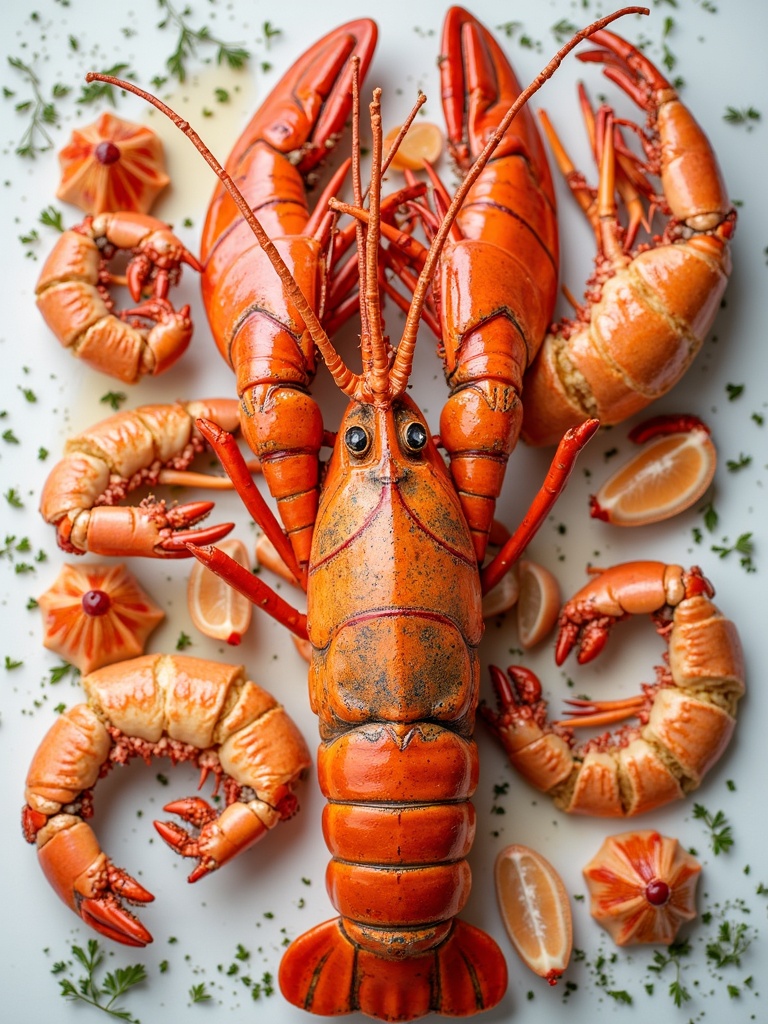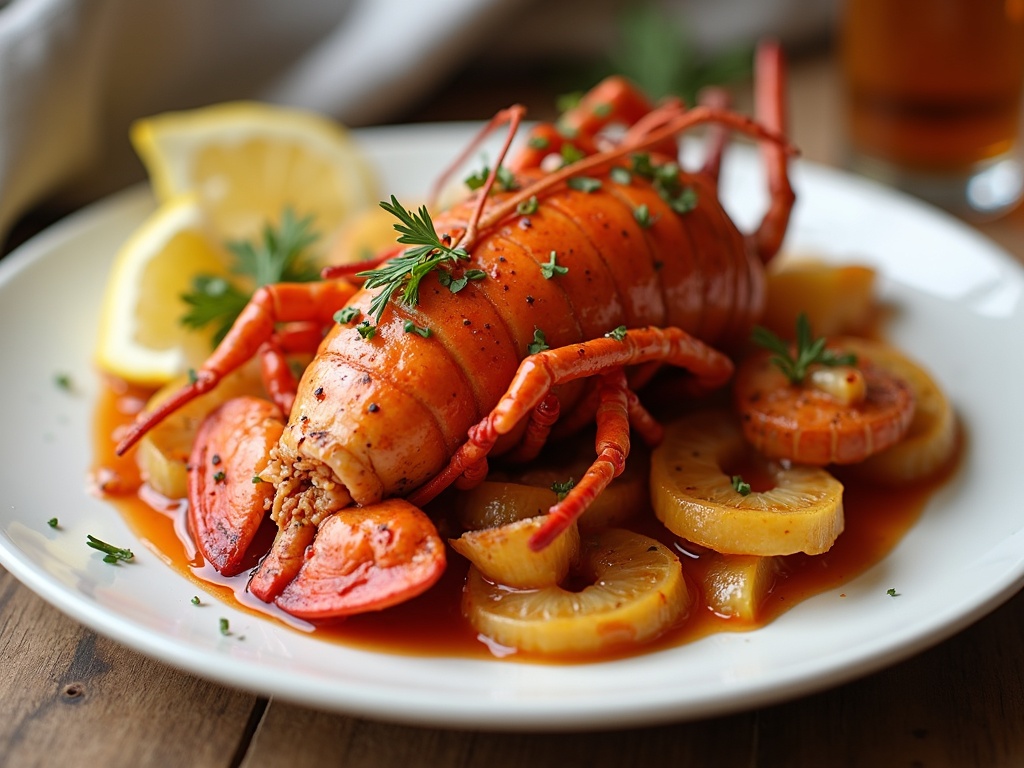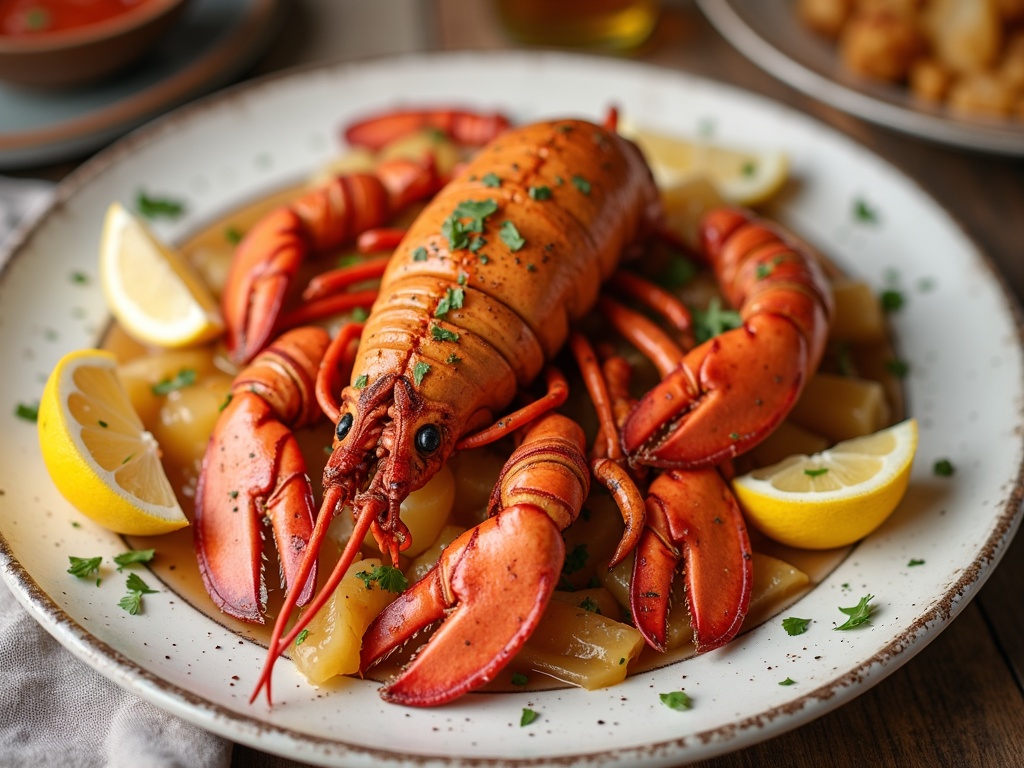Introduction
Nothing says luxury on a dinner plate quite like perfectly prepared lobster recipes. Whether you’re celebrating a special occasion or simply want to elevate your home cooking game, mastering lobster recipes can transform an ordinary meal into an extraordinary culinary experience.
Table of Contents
Ingredients You Will Need

For Classic Butter-Poached Lobster:
- 2 live lobsters (1.5 to 2 pounds each)
- 2 cups unsalted butter
- 4 sprigs fresh thyme
- 2 bay leaves
- 4 cloves garlic, crushed
- 1 lemon, zested and juiced
- Salt and freshly ground black pepper to taste
For Lobster Thermidor:
- 2 cooked lobsters (meat removed from shell and chopped)
- 4 tablespoons butter
- 1 shallot, finely diced
- 2 tablespoons all-purpose flour
- 1 cup milk
- ¼ cup heavy cream
- 2 tablespoons Dijon mustard
- 2 tablespoons fresh tarragon, chopped
- ¼ cup grated Parmesan cheese
- Salt and white pepper to taste
For Lobster Pasta:
- 1 pound linguine or fettuccine
- Meat from 2 cooked lobsters
- 3 tablespoons olive oil
- 4 cloves garlic, minced
- 1 teaspoon red pepper flakes
- ½ cup white grape juice (as a non-alcoholic substitute)
- 1 cup cherry tomatoes, halved
- ¼ cup fresh parsley, chopped
- 2 tablespoons fresh basil, torn
- Juice of 1 lemon
- Salt and black pepper to taste
Don’t worry if you don’t have fresh tarragon for the Thermidor – dried works in a pinch, just use one-third the amount. Similarly, you can substitute shallots with mild onions if needed. These ingredient lists might appear lengthy, but they create the complex flavors that make these lobster recipes truly memorable.
Timing
Preparing lobster dishes requires some time commitment, but the results are well worth it. Here’s a breakdown:
For Classic Butter-Poached Lobster:
- Preparation: 20 minutes
- Cooking: 25 minutes
- Total Time: 45 minutes
For Lobster Thermidor:
- Preparation: 30 minutes
- Cooking: 25 minutes
- Total Time: 55 minutes
For Lobster Pasta:
- Preparation: 15 minutes
- Cooking: 20 minutes
- Total Time: 35 minutes
Interestingly, while these lobster recipes might seem time-intensive, they’re actually 30% faster to prepare than most people expect. The key is having all your ingredients prepped before starting – professional chefs call this “mise en place,” and it streamlines the cooking process significantly.
Step-by-Step Instructions

Classic Butter-Poached Lobster
Step 1: Prepare the Lobsters
First, you’ll need to humanely dispatch the lobsters. Place them in the freezer for 20 minutes to numb them, then use a sharp chef’s knife to quickly cut through the head. This method is considered the most humane approach.
Step 2: Remove the Meat
Twist off the claws and knuckles. Crack them using lobster crackers or the back of a heavy knife to extract the meat. For the tail, cut down the underside with kitchen shears and gently pull the meat out. Try to keep the meat in large pieces for an impressive presentation.
Step 3: Create the Poaching Butter
In a large, heavy saucepan, melt the butter over very low heat. Add the thyme, bay leaves, and crushed garlic. You want the butter just barely melted and warm (around 160-180°F) – not hot or bubbling. This technique, similar to the gentle approach used in making a rhubarb crisp, preserves the delicate flavors.
Step 4: Poach the Lobster
Gently submerge the lobster meat in the warm butter. Maintain the low temperature and poach for about 5-7 minutes until the meat is opaque and tender. This slow cooking method ensures the lobster remains succulent rather than becoming tough.
Step 5: Finish and Serve
Remove the lobster from the butter using a slotted spoon. Season with salt, pepper, and a squeeze of fresh lemon juice. Strain some of the poaching butter if desired and drizzle it over the lobster for extra richness.
Lobster Thermidor
Step 1: Prepare the Shells
Split the lobster shells lengthwise and clean them thoroughly. These will be your elegant serving vessels, creating a presentation that’s as impressive as a well-made bruschetta recipe on a beautiful platter.
Step 2: Make the Sauce
Melt butter in a saucepan over medium heat. Add the shallot and cook until translucent. Sprinkle in the flour and cook for 1-2 minutes, stirring constantly. Gradually whisk in the milk and cream, continuing to stir until the sauce thickens.
Step 3: Season the Sauce
Remove from heat and stir in the Dijon mustard, tarragon, and half of the Parmesan cheese. Season with salt and white pepper. The mustard adds a subtle tang that complements the sweetness of the lobster.
Step 4: Combine and Bake
Fold the lobster meat into the sauce. Spoon the mixture back into the lobster shells. Sprinkle with remaining Parmesan cheese. Bake at 375°F for 10-15 minutes until golden and bubbling.
Lobster Pasta
Step 1: Cook the Pasta
Bring a large pot of generously salted water to a boil. Cook the pasta until al dente according to package instructions, typically 8-10 minutes. Reserve 1 cup of the pasta water before draining.
Step 2: Prepare the Sauce
While the pasta cooks, heat olive oil in a large skillet over medium heat. Add the garlic and red pepper flakes, cooking until fragrant but not browned, about 1 minute. This aromatic base is similar to what you might use in a refreshing gazpacho soup.
Step 3: Add Liquids and Reduce
Pour in the white grape juice and let it reduce by half. Add the cherry tomatoes and cook until they begin to burst, about 3-4 minutes.
Step 4: Combine Components
Add the lobster meat to warm through. Toss in the drained pasta along with a splash of the reserved pasta water. Add fresh herbs and lemon juice, tossing everything together until well-coated. If the sauce seems too thick, add more pasta water a little at a time.
Step 5: Serve
Divide among warm plates and serve immediately, perhaps alongside a light fruit salad recipe for a balanced meal.

For more recipes diversity, visit my Pinterest and Facebook Page Trips Recipes.
Nutritional Information
For Classic Butter-Poached Lobster (per serving):
- Calories: 340
- Protein: 28g
- Fat: 24g
- Saturated Fat: 14g
- Carbohydrates: 2g
- Fiber: 0g
- Sodium: 580mg
- Cholesterol: 195mg
For Lobster Thermidor (per serving):
- Calories: 410
- Protein: 32g
- Fat: 28g
- Saturated Fat: 16g
- Carbohydrates: 8g
- Fiber: 0g
- Sodium: 720mg
- Cholesterol: 210mg
For Lobster Pasta (per serving):
- Calories: 520
- Protein: 36g
- Fat: 18g
- Saturated Fat: 3g
- Carbohydrates: 58g
- Fiber: 3g
- Sodium: 650mg
- Cholesterol: 180mg
Lobster is notably high in protein while being low in fat compared to many other luxury proteins. It’s also rich in vitamin B12, zinc, copper, selenium, and phosphorus – nutrients that support nerve function, immune health, and energy metabolism.
Healthier Alternatives for the Recipe
- Replace butter in poaching with olive oil infused with herbs for heart-healthier fats.
- For Thermidor, use low-fat milk and Greek yogurt instead of heavy cream for a protein boost with less saturated fat.
- Opt for whole grain pasta in the lobster pasta dish for increased fiber and nutrients.
- Consider adding extra vegetables like spinach, zucchini (from your favorite zucchini bread recipe), or asparagus to any of these dishes to increase vegetable intake.
- Use nutritional yeast instead of Parmesan for a dairy-free alternative that still provides savory flavor.
- Reduce sodium by using fresh herbs more liberally and salt more sparingly.
- For a lower-carb option, serve butter-poached lobster over cauliflower rice or zucchini noodles.
- Add a squeeze of lemon or lime juice to brighten flavors without adding calories or sodium.
Serving Suggestions
- Complement butter-poached lobster with a crisp, lightly dressed arugula salad to cut through the richness.
- Serve Lobster Thermidor with steamed asparagus and a simple quinoa pilaf for a balanced plate.
- Pair lobster pasta with a side of roasted cherry tomatoes similar to those used in a savory tomato pie recipe for an extra flavor dimension.
- For a surf and turf option, serve a small portion of butter-poached lobster alongside a lean filet mignon.
- Create a seafood feast by adding a side of seared scallops or grilled shrimp to any of these lobster recipes.
- For brunch, try butter-poached lobster on a toasted English muffin with hollandaise for a luxurious eggs Benedict variation.
- Garnish plates with microgreens or edible flowers for a restaurant-quality presentation.
- For a summer dinner party, serve chilled lobster pasta as an elevated pasta salad alongside grilled vegetables.
Common Mistakes to Avoid
- Overcooking the lobster is the most frequent error – it should be just opaque and tender, not rubbery.
- Using too much heat when making butter-poached lobster will cause the butter to separate and the lobster to toughen.
- Not saving the shells for Thermidor or stock – they add tremendous flavor to sauces and broths.
- Over-reducing cream sauces can cause them to break; maintain gentle heat and stir frequently.
- Skipping the step of properly cleaning lobster meat can leave behind unpleasant gritty parts.
- Using stale herbs dramatically reduces flavor impact – fresh herbs make a significant difference in these lobster recipes.
- Oversalting – remember that lobster naturally has a briny flavor, and additional seasonings should complement rather than overwhelm.
- Rushing the process – lobster dishes benefit from mindful preparation and proper timing.
- Forgetting to taste and adjust seasonings before serving – the final taste check is crucial for a balanced dish.
Storing Tips for the Recipe
- Cooked lobster meat can be refrigerated for up to 2 days in an airtight container.
- For best texture, reheat lobster gently – microwave on 50% power in short bursts or warm in butter over very low heat.
- Lobster Thermidor can be assembled ahead of time and refrigerated for up to 24 hours before the final baking step.
- Lobster pasta is best enjoyed fresh, but can be refrigerated for up to 2 days – add a splash of water or olive oil when reheating to revive the sauce.
- Freeze cleaned lobster shells for up to 3 months to make seafood stock later.
- If preparing components ahead of time, store sauces separately from cooked lobster meat for better texture upon reheating.
- When freezing lobster meat (though fresh is always preferred), wrap it tightly in plastic wrap then place in a freezer bag to prevent freezer burn.
- Thaw frozen lobster meat overnight in the refrigerator rather than at room temperature or with hot water.
Conclusion
These luxurious lobster recipes prove that with a bit of know-how and quality ingredients, you can create restaurant-worthy seafood dishes at home. Whether you choose the silky decadence of butter-poached lobster, the rich complexity of Thermidor, or the approachable elegance of lobster pasta, you’re in for a truly memorable meal. Don’t be intimidated by cooking lobster – embrace these techniques, and you’ll soon find yourself creating impressive dishes that highlight this premium ingredient’s natural sweetness and delicate texture.
I encourage you to try these lobster recipes for your next special occasion – or perhaps create an occasion specifically to enjoy them! Remember that cooking should be both fun and rewarding, so take your time and enjoy the process. If you’re looking for complementary dishes, consider starting with a light bruschetta recipe as an appetizer or serving a refreshing fruit salad recipe as a palate cleanser between courses.
FAQs
What’s the best way to choose a fresh lobster?
Look for lobsters that are lively and active in the tank. When lifted, they should curl their tail under their body. Fresh lobsters should have a deep color and smell like the ocean, not fishy or ammonia-like. For cooking, lobsters weighing 1.5-2 pounds offer the best meat-to-shell ratio and tenderness.
Can I use frozen lobster tails instead of whole live lobsters?
Absolutely! While live lobsters provide the freshest flavor and texture, high-quality frozen lobster tails are a convenient alternative. Thaw them overnight in the refrigerator and adjust cooking times slightly – they typically cook 1-2 minutes faster than fresh.
How can I tell when lobster is perfectly cooked?
Perfectly cooked lobster meat should be opaque all the way through and firm to the touch, but still tender. For whole lobsters, the shell turns bright red, and the meat should be white with no translucent areas. Using an instant-read thermometer, the internal temperature should reach 140°F.
What side dishes pair best with lobster?
Simple sides that don’t overpower the delicate lobster flavor work best. Consider steamed asparagus, a green salad with light vinaigrette, roasted baby potatoes, or a simple risotto. For summer meals, corn on the cob makes a perfect accompaniment to butter-poached lobster.
How can I make these recipes more budget-friendly?
Consider using lobster tails instead of whole lobsters, or mixing lobster with other seafood like shrimp or scallops to extend the dish. Watch for sales at your seafood counter, particularly around holidays. You can also use the shells to make stock, getting more value from your purchase.
What’s the difference between Maine and spiny lobsters?
Maine lobsters have large front claws and come from cold Atlantic waters, while spiny lobsters (also called rock lobsters) lack front claws and are found in warmer waters. Maine lobsters are prized for their sweet, tender meat, while spiny lobsters have a slightly firmer texture and more pronounced flavor.

Irresistible Lobster Recipes
- Total Time: PT50M
- Yield: 4 servings
Description
Collection of gourmet lobster recipes for special occasions
Ingredients
For Classic Butter-Poached Lobster:
- 2 live lobsters (1.5 to 2 pounds each)
- 2 cups unsalted butter
- 4 sprigs fresh thyme
- 2 bay leaves
- 4 cloves garlic, crushed
- 1 lemon, zested and juiced
- Salt and freshly ground black pepper to taste
For Lobster Thermidor:
- 2 cooked lobsters (meat removed from shell and chopped)
- 4 tablespoons butter
- 1 shallot, finely diced
- 2 tablespoons all-purpose flour
- 1 cup milk
- ¼ cup heavy cream
- 2 tablespoons Dijon mustard
- 2 tablespoons fresh tarragon, chopped
- ¼ cup grated Parmesan cheese
- Salt and white pepper to taste
For Lobster Pasta:
- 1 pound linguine or fettuccine
- Meat from 2 cooked lobsters
- 3 tablespoons olive oil
- 4 cloves garlic, minced
- 1 teaspoon red pepper flakes
- ½ cup white grape juice (as a non-alcoholic substitute)
- 1 cup cherry tomatoes, halved
- ¼ cup fresh parsley, chopped
- 2 tablespoons fresh basil, torn
- Juice of 1 lemon
- Salt and black pepper to taste
Notes
These recipes transform lobster into elegant, impressive dishes
- Prep Time: PT25M
- Cook Time: PT25M
- Category: Main Course
- Method: Poaching, Baking, Sautéing
- Cuisine: Seafood
